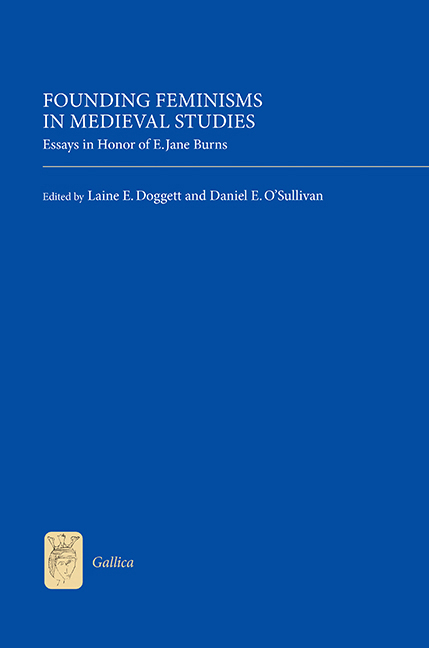Book contents
- Frontmatter
- Contents
- List of Illustrations
- List of Contributors
- Acknowledgements
- Introduction: The Work of E. Jane Burns and the Feminisms of Medieval Studies
- E. Jane Burns: A Bibliography
- Part I Debating Gender
- Natural and Unnatural Woman: Melusine Inside and Out
- Nurturing Debate in Le Roman de Silence
- The Man Backing Down from the Lady in Trobairitz Tensos
- Having Fun with Women: Why a Feminist Teaches Fabliaux
- Part II Sartorial Bodies
- Part III Mapping Margins
- Part IV Female Authority: Networks and Influence
- Afterword: A Response to the Volume
- Index
- Tabula Gratulatoria
- Already Published
Having Fun with Women: Why a Feminist Teaches Fabliaux
from Part I - Debating Gender
Published online by Cambridge University Press: 05 July 2016
- Frontmatter
- Contents
- List of Illustrations
- List of Contributors
- Acknowledgements
- Introduction: The Work of E. Jane Burns and the Feminisms of Medieval Studies
- E. Jane Burns: A Bibliography
- Part I Debating Gender
- Natural and Unnatural Woman: Melusine Inside and Out
- Nurturing Debate in Le Roman de Silence
- The Man Backing Down from the Lady in Trobairitz Tensos
- Having Fun with Women: Why a Feminist Teaches Fabliaux
- Part II Sartorial Bodies
- Part III Mapping Margins
- Part IV Female Authority: Networks and Influence
- Afterword: A Response to the Volume
- Index
- Tabula Gratulatoria
- Already Published
Summary
Seven years after Christopher Hitchens launched his polemical claim that women are not funny, writers and their online readers continue to engage in vigorous, often acrimonious, conversations as to whether women are able to create humor. Even after the author himself has passed away, readers express indignation that anyone in the twenty-first century would try to erase from all women such a fundamentally human characteristic. Hitchens, of course, was famous for his deliberately provocational writing aimed at stirring up controversy (the subtitle “provocation” is actually announced at the top of the Vanity Fair piece). Some of the irritation provoked by Hitchens's article, I would argue, stems less from an objection to the claim itself than from the author's knowing disregard for the reactions of his female readers. Realizing full well that he would raise the ire of women, he delighted in the feminist reactions his words would provoke, as was made evident in his 2008 YouTube video, “Why Women Still Aren't Funny.” While a common feature of Hitchens's journalism was its brazen pillorying of a wide range of cherished ideas or beliefs, the “Why Women Aren't Funny” piece was just another in a long list of male-authored pieces having a bit of fun with women, and this joke is, well, getting a bit old.
But more to the point of my essay, Hitchens's piece essentially boils down to a simplistic evolutionary argument that men have had to be funny in order to demonstrate their intellect and attract women whereas women, to attract men, need simply rely on their physical desirability: men make jokes and women laugh at them. There is actually nothing controversial in that claim. Hitchens essentially said that sexist norms continue today – but he did so in a way that replicated the patronizing stance of countless male authors who have made jokes to exclude, rather than include, their female audiences, and who tend to excuse their offensive words by blaming humorless or unskilled female readers. But actually studying jokes and humorous texts entails a much more sophisticated toolbox of perspectives from anthropology, history, linguistics, philosophy, and literature. Evolutionary biology, on its own, is simply not up to the task of something so culturally contingent and context-specific.
- Type
- Chapter
- Information
- Founding Feminisms in Medieval StudiesEssays in Honor of E. Jane Burns, pp. 61 - 70Publisher: Boydell & BrewerPrint publication year: 2016

